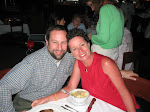Someone asked me recently why I race. If one was to query the triathlete population, the reasons would be infinite, ranging from the profound to the ridiculous (although if you spoke to the athlete with the "ridiculous" reason, there is a good chance it wouldn't be so ludicrous to them :).
A long time ago, I found a quote from Teddy Roosevelt that I've adopted as my Personal Motto. Roosevelt was famous for overcoming enormous odds to succeed in nearly any endeavor. In his book "The 21 Irrefutable Laws of of Leadership," John Maxwell describes Roosevelt's life:
Of all the leaders this nation has ever had, Roosevelt was one of the toughest -- both physically and mentally. But he didn't start that way. America's cowboy president was born in Manhattan to a prominent wealthy family. As a child he was puny and very sickly. He had debilitating asthma, possessed very poor eyesight, and was painfully thin. His parents weren't sure he would survive.
When he was twelve, young Roosevelt's father told him, "You have the mind, but you have not the body, and without the help of the body the mind cannot go as far as it should. You must make the body." And make it he did.
Roosevelt began spending time every day building his body as well as his mind, and he did that for the rest of his life. He worked out with weights, hiked, ice-skated, hunted, rowed, rode horseback, and boxed. In later years, Roosevelt assessed his progress, admitting that as a child he was "nervous and timid. Yet," he said, "from reading of the people I admired...and from knowing my father, I had a great admiration for men who were fearless and who could hold their own in the world, and I had a great desire to be like them." By the time he graduated from Harvard, he was like them...
The following quote has helped me in times of triumph as well as through abject failure...inevitably I get back in the saddle to ride again. Next time someone puts you down for trying (and perhaps failing at) your latest endeavor, remember the following:
"It's not the critic who counts; Not the man who points out how the strong man stumbles, Or where the doer of deeds could have done them better. The credit belongs to the man who is actually in the arena, whose face is marred by dust and sweat and blood, who strives valiantly; Who errs and comes up short again and again; Because there is not effort without error and shortcomings; But who does actually strive to do the deed; Who knows the great enthusiasm, the great devotion, who spends himself in a worthy cause, who at the best knows in the end the triumph of high achievement, and who at the worst, if he fails, at least he fails while daring greatly; So that his place shall never be with those cold and timid souls who know neither victory nor defeat."
Subscribe to:
Post Comments (Atom)



No comments:
Post a Comment